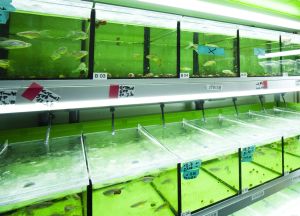Press Release 121/2012
Many Findings Can Be Transferred to Humans – Opening of the First Zebrafish Resource Center in Europe and First Screening Center in the World on KIT Campus North
Zebrafish are considered ideal model organisms for biomedical research.

(Photo: Martin Lober)
Zebrafish share most organ systems with humans. This makes them ideal model organisms to study the causes of human diseases like cancer or heart diseases. For this purpose, research needs a variety of zebrafish lines. With the European Zebrafish Resource Center (EZRC), Karlsruhe Institute of Technology (KIT) is now opening the first central repository for such lines in Europe. The EZRC is funded jointly by the Biointerfaces programme of the Helmholtz Association and the Klaus Tschira Foundation. The Klaus Tschira foundation provides a funding of 1.5 Million Euro over three years.
Representatives of the media are cordially invited to come to the official opening on Wednesday, July 18, 11 hrs on KIT Campus North.
“Zebrafish are robust, small, and reproduce quickly. Being vertebrates, they share most major organ systems with humans. This makes them ideally suited for biomedical research,” explains Professor Uwe Strähle, Head of the Institute of Toxicology and Genetics (ITG) that operates the Zebrafish Resource Center on KIT’s Campus North. “Zebrafish repair a spinal cord lesion, heart or kidney diseases or a damaged optic nerve all on their own. Their organ function is restored completely.”
Moreover, their eggs are transparent and develop outside of the body of the mother. This allows researchers to observe the development of organs or even individual cells in the embryo as well as in the larva, which is also transparent, without harming adult animals. Such experiments may replace numerous animal experiments with rats or mice. The fish are ideally suited to studying the causes of cancer, heart disease, and behavioral disorders and to evaluating potential drugs. In recent years, laboratories in Europe alone have generated thousands of zebrafish lines, each of which carries either a particular mutation that can serve as a model for human disease, or a fluorescent marker that labels a particular tissue. However, European researchers have been lacking a central repository to store and distribute these fish. The European Zebrafish Resource Center will meet this need in the future. The EZRC has over 3,000 aquaria for keeping live fish as well as freezers capable of holding about 80,000 sperm samples. The EZRC will also be the first zebrafish screening center worldwide, welcoming guest researchers who will perform systematic research on its collection. The scientists will be provided with technologies such as high-throughput synthesis of drug candidates, genome sequencing, and robotics and software developed in-house for sample handling, microscopy, and image analysis. The EZRC will also be the central hub of ZF-HEALTH, a recently started collaborative project funded by the European Commission’s 7th Framework Programme.
For more information, click: www.itg.kit.edu/ezrc
The grand opening ceremony of the EZRC will take place on Wednesday, July 18, 11 hrs, at the Leibniz Saal of the Fachinformationszentrum (FIZ) on KIT Campus North (building 240, Hermann-von-Helmholtz-Platz 1, 76344 Eggenstein-Leopoldshafen, Germany).
Program of the Opening Ceremony
All presentations will be given in German.
11.00 hrs Welcome addresses
Professor Doris Wedlich, Chief Science Officer, KIT
Professor Christiane Nüsslein-Volhard, Director of the Department of Genetics, Max Planck Institute for Developmental Biology, Tübingen
11.25 hrs “Warum Zebrafische und dann auch noch so viele?“ (“Why zebrafish and why so many?“)
Professor Uwe Strähle, Head of the Institute of Toxicology and Genetics, KIT
11.40 hrs “Zebrafische helfen die Komplexität des Gehirns zu verstehen” (“Zebrafish help understand the complexity of the brain”)
Professor Wolfgang Driever, Head of the Department of Developmental Biology, University of Freiburg
11.55 hrs Opening and opening film of EZRC
12.15 hrs Reception
About the Klaus Tschira Foundation
The Klaus Tschira Foundation (KTS) supports natural sciences, mathematics, and computing and wishes to further promote work in these areas. This is a federal undertaking that starts at the kindergarten level and continues through to schools, universities, and research institutions.
Further information: http://www.klaus-tschira-stiftung.de
About ZF-HEALTH
“ZF-HEALTH – Zebrafish Regulomics for Human Health” is a large-scale integrating project funded by the European Commission as part of its 7th Framework Programme, encompassing 19 partner organizations in nine countries, and coordinated by Karlsruhe Institute of Technology. The project started on July 01, 2010 and is scheduled to run over a period of five and a half years. Further information: http://zf-health.org
Karlsruhe Institute of Technology (KIT) is a public corporation according to the legislation of the state of Baden-Württemberg. It fulfills the mission of a university and the mission of a national research center of the Helmholtz Association. KIT focuses on a knowledge triangle that links the tasks of research, teaching, and innovation.
le, 11.07.2012
For further information, please contact:
Margarete Lehné
Presse, Kommunikation und Marketing
Phone: +49 721 608-48121
Fax: +49 721 608-45681
margarete lehne∂kit edu
The photo of printing quality may be requested by presse∂kit edu or phone: +49 721 608-47414. The press release is available as a PDF file.


